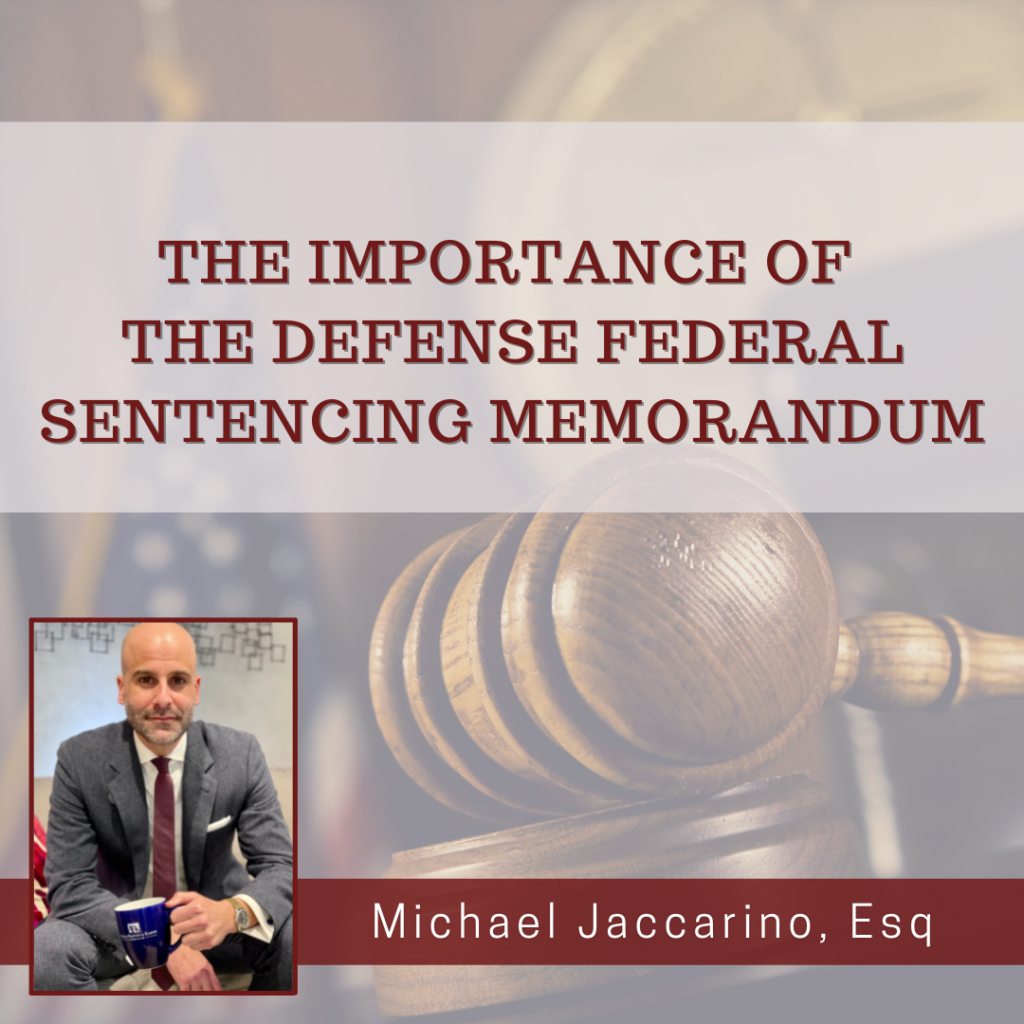ON BEHALF OF MICHAEL JACCARINO, ESQ. OF AIDALA, BERTUNA & KAMINS, PC POSTED IN BLOG ON MONDAY MAY 16, 2022
An experienced federal sentencing attorney will understand what information about the federal offense and the defendant being sentenced should be included for the federal judge to consider.
Approximately 97% of all federal criminal defendants plead guilty. Over 80% of the remaining individuals who proceed to trial are convicted. There is, therefore, over a 98% chance that a person charged with a federal crime will ultimately face a judge for purposes of sentencing. “How much time am I going to do?” For most individuals, this is a key concern. The following tips will help attorneys and their clients obtain the lowest possible sentence.
The federal sentencing guidelines consider the category of the criminal offense and the category of the defendant and provide parameters for sentencing. They are developed by the United States Sentencing Commission, which is an independent agency that has the authority to make these guidelines under 28 USC 994. The Guidelines are not mandatory but must be considered by judges when determining a sentence.
Studies suggest that 80 percent of the time, a judge has a “tentative sentence” in mind even before the sentencing hearing begins. Accordingly, the best way for a defense attorney to influence the judge’s selection of a “tentative sentence” is to file a sentencing memorandum, which fully sets forth the facts and arguments supporting the requested disposition, approximately seven days before sentencing (unless otherwise required by local rule).
Unlike in state court practice, where parties rarely file formal sentencing memorandum, particularly after a negotiated plea agreement is reached, federal court practice almost always involves a formal written sentencing position from both the government and the defendant. This is largely the product of the much greater sentencing discretion enjoyed by federal judges. Even in the case of a fully negotiated plea agreement, the judge will often have substantial discretion to vary from a guidelines range agreed to by the parties by either increasing or decreasing the punishment faced by the defendant.
If the defense attorney presents the judge with a solid memorandum that uses the 18 U.S.C. § 3553(a) factors to demonstrate why a sentence below the guideline range is “sufficient, but not greater than necessary” to achieve the goals of sentencing, including character letters from people willing to offer insight into a client’s true nature notwithstanding their awareness of the offense of conviction, counsel will go a long way toward achieving the desired sentence. Waiting until the actual hearing to make the sentencing case, as has been a historic practice in state courts, makes it far less likely that the court will give appropriate weight to the defense’s position.
In most federal cases, both the criminal defense attorney and federal prosecutor will submit a sentencing memorandum to the court arguing in support of their requested sentence. These documents are most often lengthy and could include legal arguments as to the sentencing guidelines, evidence, character letters, and expert reports.
An experienced federal sentencing attorney will understand what information about the federal offense and the defendant being sentenced should be included for the federal judge to consider. The defense team should be creative and let judges be judges. After considering guidelines departure factors, the lawyer should think of things that make the defendant’s case unusual. Things that are unusual about the client or the offense, that is, things that take the case outside the guidelines “heartland,” can be good grounds for a departure. But the defender must not stop there. Anything about the client, the offense, and the sentences that similarly situated defendants have received can support an argument that a sentence below the bottom of the guideline range is “sufficient, but not greater than necessary” to meet the goals of sentencing, and can support an argument that a sentence within the range is “greater than necessary” to meet those goals.
Michael Jaccarino, and the criminal defense attorneys at Aidala, Bertuna & Kamins, PC, have decades of experience in dealing with sentencing hearings in federal court.
For more information or more fact-specific discussions, call our office and ask to speak with attorney Michael Jaccarino.



